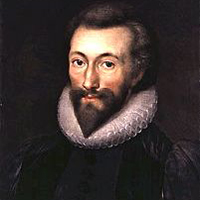The Anniversarie by John Donne: Summary and Analysis
The Anniversarie by John Donne is among the most expressive poems of the Songs and Sonnets. It caters the lovers' sense of the agelessness of their world of love. The speaker states that even the king and the sun have grown older and reach a year near to the death. But he, along with his beloved is ageless and death cannot kill them because their love is pure and they are connected with the hearts.

John Donne (1572-1631)
So, they will remain alive through their love even after death. Thus, they are immortal. He rejoice-fully invites his beloved to be noble and loyal in love so that life becomes charming and lasting. The claim is that their love is protected from the pressure of time.
The paradox of the poem lies here when the speaker says their day is an 'everlasting day' of love which takes them beyond any concern with 'yesterday' or 'to morrow'. But the real motive of the poem is sooner revealed clearly; which is, firstly, to celebrate the fact that they have now enjoyed a whole year of yesterday together, and secondly; to anticipate a series of equally happy tomorrows — a series which, Donne is later to admit, that there is no sufficient amount of good faith or good fortune which can possibly make 'everlasting'. In short, to celebrate an anniversary is also to admit that even lovers have to submit to the world of time.
The tone in The Anniversarie is serious rather than jubilantly paradoxical. The poem begins as if John Donne is preparing to acclaim the mighty ones of the earth — the kings and their favorites, the honored, the beautiful, the clever — but the verse sweeps on, and it becomes clear that they are mentioned in order that he may record that they, too, are moving on towards their graves. Even the sun, customarily the symbol of all that is glorious and powerful, are presented not as the monarch of the temporal world, but as its chief victim, making times only to be itself made older by them, 'as they passe'. The shortness of all things is acknowledged, with measured calmness, as one of the central facts of human existence.
In the first stanza of the poem, Donne confirms the 'first, last, everlasting day' of their love. The 'first' and 'last', were rejected and conquered by 'everlasting'. But 'first' and 'last' are not to be sacked so easily: there was a time when they 'first one another saw', and there will come a time when they have to leave each other 'at last in death'. The thought of death pushes itself forward in the second stanza:
Two graves must hide thine and in corse, If one might, death were no divorce'
The fact of death is stated with the extreme simplicity; they will both die, and be buried. The calm acceptance of death, what is, after all, the common lot of mankind is put into words so easily:
Alas, as well as other Princes, wee, (Who Prince enough in one another bee,) Must leave at last in death, these eyes, and eares, Oft fed with true oathes, and with sweet salt teares;
Donne admits that though their love is eternal, their physical bodies are not so privileged to be eternal. When they die they are forced to be separated from their bodies; the same bodies from which they enjoy and share their mutual love. They will end in a kind of earthly “divorce” (line 13). But, as a consolation, he immediately reminds his beloved asserting that they will reunite in their souls after death. The religious view is brought in to support the lovers' claims to an everlasting day of mutual love, but the effect of the stanza as a whole is to suggest once again the intensity with which Donne fears the everlasting night of utter separateness.
In the third stanza, he says, they will be totally happy (`throughly blest') in the next world, but that will be 'then' and 'there above'. The arguments in the second stanza make us clear that the lovers are unwilling to forget the happiness available to them here and now, in this world. Moreover, 'there above' the lovers will be 'no more, than all the rest'; they will have lost their sense of being peculiarly and supremely blessed with their love. It is not so in this world.
The unavoidable boundaries of human life are ultimately accepted. They cannot be away from the fear of death, but can keep the fear under control. For this, they need to 'love nobly'. “Nobly” here provides double meaning: they should love in a grand manner, and they should love with noble hearts. He wants to add years and years in his passage of love life and boldly states that they will go on celebrating sixty more anniversaries.
Cite this Page!
Shrestha, Roma. "The Anniversarie by John Donne: Summary and Analysis." BachelorandMaster, 9 Mar. 2018, bachelorandmaster.com/britishandamericanpoetry/the-anniversarie.html.
